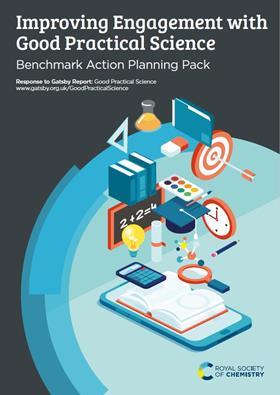Improve practical provision and ultimately student engagement with science learning using this Gatsby benchmark action planning pack
As described in the Good Practical Science report by Gatsby, policy makers, professional bodies and many other relevant organisations regard practical science as an important part of science education. The report also finds that students find practical science engaging and that, if a student engages with a subject, they are more likely to apply themselves to learning.
This pack has been produced to support schools in identifying opportunities for improving their standing against the 10 good practical science benchmarks set out in the Gatsby report, thereby improving practical provision and ultimately student engagement with science learning.
Download this
Use the pack to rate your school’s current status against each of the benchmarks defined in the Gatsby report and to derive an action plan.
It is important to note that these benchmarks are the world-class standards and should be considered pragmatically by schools. Exactly how they are used will depend, in part, on circumstance but findings from the full report suggest they have a role for science leaders in:
- Self-evaluation to under-pin continuous improvement
- Making business cases for changes or improvements in science provision
- Assisting in identification of training and development needs for teachers and technicians.
The full report, including further details of why schools should consider these benchmarks is available here.
Usage instructions
The objective for this action planning pack is that it will become a working document to support schools in their use of the 10 good practical science benchmarks. It is not intended to be used as a ranking of one school (or science subject) against another.
Within this pack, each of the 10 benchmarks for good practical science are broken down into sub-criteria. Schools should:
- Consider their status against the sub-criteria as a percentage and mark their position along a continuum.
- Mark whether attaining 100% of the sub-criteria is fully controllable by the school.
- Reflect upon the marked statuses to derive an implementable action plan for improving the schools’ position.
Benchmarks 1, 3 and 6 are considered to be ‘enablers’ for the others and should therefore be prioritised (Section 5.3, of the full report).
More recommended reading
- Practical advice for practical work – an article analysing the Gatsby report recommendations.
- Maximising learning from practicals – with classroom resources, part of our 7 simple rules series.
- Losing our technicians: the crisis facing schools – feature addressing staffing issues.
The pack summarises the 10 benchmarks then allows space for you to reflect on each of the sub-criteria in detail, with specific prompts to plan action against each one.
Benchmark summaries
Benchmark 1: Planned practical science
Every school should have a written policy that explains why teachers use practical science, the outcomes they expect from it and how they achieve those outcomes. The process of producing the policy is as important as the policy itself.
Benchmark 2: Purposeful practical science
Teachers should know the purpose of any practical science activity, and it should be planned and executed so it is effective and integrated with other science learning.

Benchmark 3: Expert teachers
Teachers should have subject-specialist training (both initial and continuing) in the subject (biology, chemistry, physics etc.) and age range they teach, so they can carry out practical science with confidence and knowledge of the underlying principles.
Benchmark 4: Frequent and varied practical science
Students should experience a practical activity in at least half of their science lessons. These activities can be short or long, but should be varied in type.
Benchmark 5: Laboratory facilities and equipment
Schools should have enough laboratories to make it possible for every teacher to do frequent practical science safely. Each laboratory should have sufficient equipment for students to work in small groups.
Benchmark 6: Technical support
Science departments should have enough technical or technician support to enable teachers to carry out frequent and effective practical science.
Benchmark 7: Real experiments, virtual enhancements
Use digital technologies to support and enhance practical experience, but not to replace it.
Benchmark 8: Investigative projects
Students should have opportunities to do open-ended and extended investigative projects.
Benchmark 9: A balanced approach to risk
Students’ experience of practical science should not be restricted by unnecessary risk aversion.
Benchmark 10: Assessment fit for purpose
Assessment of students’ work in science should include assessment of their practical knowledge, skills and behaviours. This applies to both formative and summative assessment.
Downloads
GatsbyGoodPracticalScience_SchoolActionPlanningPack_AMENDED
Handout | PDF, Size 0.64 mb
Additional information
This document was produced by Heidi Dobbs (Royal Society of Chemistry education coordinator) in collaboration with the Gatsby Charitable Foundation.


















No comments yet